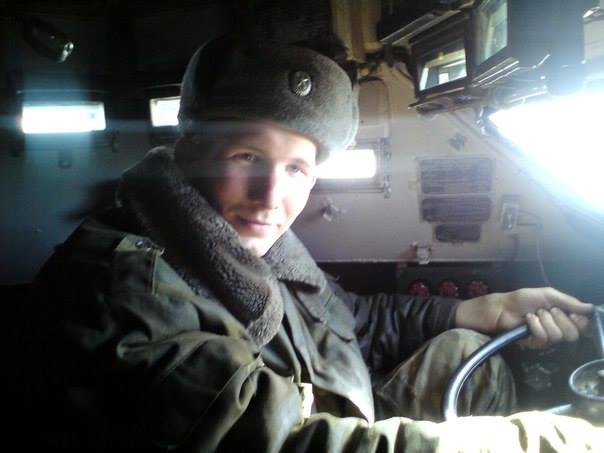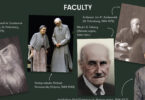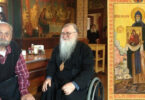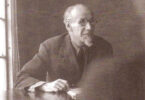The Holy Trinity Seminary graduates carry out their ministry in a variety of places and capacities. The ones we know about the most tend to be our graduates in the episcopal and priestly ranks; we know less about the deacons and hardly anything at all about those who have remained as laymen. These include both parish and prison workers and men in ordinary civil employment. This Skype interview with Constantine Sergeevich Nogovitsyn, our 2007 graduate should begin to redress this imbalance.
I am happy that we meet at last. Could you tell us what brought you to Jordanville and a few words about yourself?
There was a reason I ended up in Jordanville; when my parents became believers, my mom first started going to the parish of the Church Abroad, which had just started being active in Russia and was opening new parishes. And that’s where we started attending services. This was in the North, in the in the Khanty-Mansiysk Autonomous Okrug. Then, on retirement, my parents moved to a town called Ishim which was then the administrative center for the Diocese of Ishim and Siberia, overseen by Vladyka Eutyches. When I finished high school, I wanted to enter the seminary‑ somehow, everything was leading to this. I intended to go to Tobolsk, but Vladyka said that, as we are of the Church Abroad, we should at least try for Jordanville. Igumenia Alexandra (Cherniavskaia) really helped me in this decision; she wrote a reference and together with Vladyka Eutyches’ recommendation everything came together in a miraculous way. I say miraculous, because there were already difficulties with obtaining American visas. All the same, I ended up in Jordanville – on Vladyka Eutyches’ recommendation.
I see. And what has Jordanville given you? Tell us what happened to you after Jordanville. So, you went back home, and then what?
Yes; at first I wanted to stay on in America, in the US. I had an obedience at the St Job of Pochaev Press, was working there and I had all the necessary papers to stay in the US. But then, there were pressing reasons for me to return to Russia. When I got home, I started attending services at the St Nicholas Cathedral of the Moscow Patriarchate. The re-unification had already taken place – it was 2008 – and I began working in the deanery, as the dean’s secretary. Then I decided I ought to continue with my theological education and petitioned Vladyka Hilarion, our First Hierarch, to endorse my application to the St Petersburg Theological Academy, which he duly did. In this way, I also completed a Master’s program at the Petersburg Theological Academy. Afterwards, I did my compulsory [Russian] military service and then returned to my home town, Ishim. For a while, I was employed in a secular job. Then I was invited by the ruling bishop of the newly-created Ishim and Aromashevo Diocese to take up the chanter’s post at the St Nicholas Cathedral and also to work in its information department. In addition, I am employed as a teacher at the Ishim Orthodox Grammar School – as a caretaker too, of course, just for the extra kudos (laughs)
I see.
I teach both the Foundations of Orthodox Culture course, which is a newly-created compulsory subject and Divinity which is an elective.
So, the course is compulsory because it’s an Orthodox school?
Yes Divinity or Foundations of Orthodox Culture are compulsory in Orthodox schools. Such are the Synod’s requirements.
Yes, that’s clear.
Foundations of Orthodox Culture is one of the component modules of the broader “Foundations of Religious Culture and Secular Ethics” program. It introduces basic concepts from a whole variety of religions and secular ethical systems. Obviously, as the school is an Orthodox one, the Orthodox culture is chosen as the main component.
I understand. So, it seems that your Jordanville education underpins your whole professional work?
Oh, yes. Yes!
And how would you rate it? How much have you gained from a Jordanville education in terms of your professional life?
First of all, I gained a great experience of the spiritual life. It was impossible to fail to be inspired by the example of Vladyka Laurus who was the superior of the monastery and the rector of the seminary while I was there. I think his example inspired us all and continues to do so. Secondly, I was coming into contact with the history of the other part of the Russian Orthodox Church, meeting notable figures from the immigration. This too could not fail but have a positive influence on me. In general, I consider the experience of church life within Russia to be somewhat different from that of the Russian Church Abroad. And when I was a seminarian, I was able to tap into this common experience ‑ the life of the Church Abroad and her parishes.
Also, much of what is taught at Jordanville is of a high standard. I liked some aspects of History; for example, the way Dmitry Pavolvich Anashkin taught Byzantine Studies. By the way, Canon Law ‑ your course ‑ was very interesting too.
Thank you.
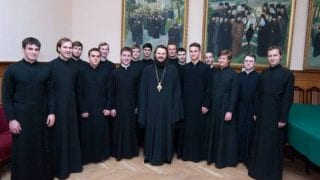
With Bishop Ambrose, the rector of St. Petersburg’s theological schools, and fellow students of SPb Academy
What I mean is, you can’t argue with academic standards. I am not saying that the standards are lower than in Russia. For instance Liturgics was well taught by Fr Roman ; I am still using the skills gained there in my chanter’s job now. However, academics aren’t everything; what Jordanville is rightly famous for is its family atmosphere – at least that’s what it was famous for in my days. I say this with no prejudice to its academic standards which I also rate highly.
Thank you.
Compared to the seminary standards– I was studying at the St Petersburg Academy – I can’t say that there was much difference or that I felt like a complete dunce there.
So, you got in without much difficulty and were able to undertake all the academic tasks you were set?
Yes. At one point, I even had a high grade average in St Petersburg. So my Jordanville education was definitely helpful; I didn’t have any gaps in my knowledge.
But could you identify any gaps? I mean, have you ever thought, “It’s a shame they didn’t pay any attention to such and such or didn’t teach us this?”
Maybe not so much in terms of teaching but in the sense that the administration could have worked harder to organise the students’ time and recreation. There were always obediences to carry out and everything, but there was still plenty of spare time that could’ve been filled with …. The administration could have set up a few meetings etc. Although, already in my time they had begun organising seminars and conferences – I mean, that experts in their fields were invited to come in and talk on different subjects. But it was still not enough.
So, we need more encounters with experts and other interesting people?
Yes, in order to occupy the student completely – this would be a real spiritual school. Perhaps, a few excursions or outings would have been useful too… This is what I personally lacked – a sense of discipline. There was a bit too much of a family atmosphere and maybe not quite enough rigor in scheduling.
I see. And how does your experience of the army compare to Jordanville?
Actually, it’s not even specifically Jordanville – any organised body will have some parallels with the army. The boys – former seminarians ‑ who served alongside me, all said the same thing: it’s the same system, the same reveille and lights out, meals on a schedule etc. Especially, since I wasn’t an 18 year-old anymore; I was well over 20 by then. I was 25 years old when I became a soldier and my seminary experience… well, it’s given me some discipline to fall back on. It wasn’t as if I was facing something completely new; this was the world I was already familiar with – the world of order and discipline. This helped me even in the army.
And the hierarchy too?
Yes, I was well used to a hierarchical way of doing things and even some form of bullying too…. What do I mean? Well, it’s really a case of the senior ranks taking the juniors in hand. In any case, I was serving in an Orthodox company, under Fr Barnabas so it wasn’t so scary. But, yes, the seminary was helpful even in the army.
That’s good to hear. Many things are changing at Jordanville now; we are hoping to start our Master’s program from next year and already all candidates whose native language is not English or who haven’t studied in English before are required to pass the TOEFL exam . This has had an effect on how many students apply from Russia, because now they need to make an effort to learn English, which in itself is quite an achievable task. Do you care to comment?
I think this exam is badly needed. I also think that these innovations will help not only with the seminary studies, but also with employment afterwards, especially abroad. What sort of a job would you be able to get without any English anyway? I felt I was lacking there too. By the way, I am glad you reminded me about the language requirement; I think making proficiency in English compulsory may be a smart move. Also, it’s good for students to have to make an effort; I am sure students from Russia receive a bit of money and this alone should make them take their studies seriously, to think really hard, “Why have you come all this way to Jordanville, what do you want to get out of this for yourself?” I think that’s a positive move, seeing that the seminary is located abroad and issues an American diploma.
Consequently, our teaching is mostly conducted in English now. We have only one group of students remaining who were admitted before the English language requirement, so that out of my ten teaching hours a week, nine are conducted in English. Our student body is changing and, with it, the face of the seminary which is somewhat different from what it was in our days. Life itself is forcing us to embrace change.
Nevertheless, I think this is a completely natural process. Things are bound to change when the old guard moves on and our founding fathers have reposed. We’ve got to change, to move on with the times and, in some ways, to adapt to the demands of the world around us, isn’t that so? I mean, if the seminary is envisaged not so much as catering for Russia, but for tending the needs of those living abroad, it’s natural that the teaching should be in English. Nowadays, we have many seminaries within Russia and we don’t need or expect any particular help from Jordanville. Russian seminaries are quite capable of training their own ministers themselves. I would say that the demand for a Jordanville education is greater coming from abroad and obviously this extends to the language too. We still need Russian speakers in the diaspora but not exclusively so. Services and pastoral work can be carried out in Russian but keep English for studies. You need to have some sort of a standard approach.
Of course, because learning Russian, thinking about grammar, cases etc is definitely not for everyone. For example, to know Russian to the extent that you can take in Dmitry Pavlovich’s lectures requires a lot of preparation before the seminary.
Without a doubt, this has an effect on our English-speaking students. I remember how Philip (a seminarian from Brazil) suffered a lot through this. It was hard for him to understand why he’d come to study in America, only to have his studies conducted in Russian at Jordanville. It makes no sense.
We have now eliminated this problem by making English our lingua franca. We have the same requirements from our Spanish-speaking students, i.e. because we can’t provide instruction in Spanish or Portuguese. So, English is our common teaching language. And what sort of tasks, ‑ I mean ecclesial tasks ‑ do you face in your own home town, in Ishim? Besides what is already outlined in the Gospel, of course…. I should put it like this: can you describe your mission objectives in matters pertaining to our salvation? What is happening in this area right now?
Vladyka Tikhon, our diocesan bishop, identified a few key areas immediately after his appointment. He placed youth education, the Church’s mission to the young people in the very first place. After that comes the restoration of church and former church property ‑ buildings which were at one time seized by the state. The process of their restoration and renovation is in full swing now. Naturally, the expansion of the diocese is a part of this process, i.e increasing the number of parishes and clergy. We have an acute clergy shortage in the diocese. Our diocese is rather small – well, it isn’t very large – and the setting is mostly agricultural. No petrodollars here! It’s all rather small and homely, so there is no great rush of people wanting to move here. Hence the clergy shortage.
And the diocese’s name? Is it just Ishim?
It’s called Ishim and Aromashevo. Aromashevo is a regional center, as is also Ishim which is a major railway junction between Tiumen and Omsk on the Trans-Siberian Railway. This is the main task facing our church – educating and enlightening our people, because nowadays, people have a multitude of needs. They come to church; they are interested to find out what it’s all about. This is partly because people feel a spiritual gap within, when they begin to understand that human happiness isn’t dependent solely on material wealth. They feel there is something else to life and this something keeps bothering them. This feeling then turns their mind to God and leads them to the church to seek support from the clergy. This takes the form of catechization, mission and yes, work with the youth too, of course. Our diocese for example runs the largest temperance society of the whole of the Ural federal state. There was a very successful campaign of local competitions when villages competed among themselves for the right to be named a “sober village” which in turn attracted state subsidy. The authorities also take a keen interest in anti-alcoholism issues. Starting from 3rd June, the local authorities requested the diocese to make a series of visits to school day camps. I mean, schools organise summer recreational camps and we have been asked to visit and address the students . So that’s what we will be doing in June, working with the youth again.
This is social ministry. Are there any opportunities also to help those who have found themselves in difficult circumstances and can’t make ends meet? Is the church doing anything at all in this area?
We have a sisterhood in the cathedral which is engaged in acts of mercy – and in some parishes too. They visit care homes, various clinics and infirmaries – TB, cancer and psychiatric hospitals. There was also a collection in aid of the Donbass refugees organised on the initiative of our sisterhood ‑ and other parish sisterhoods too. We have a youth movement called “Peacemaker” which sponsored a drive called “From the Children of Ishim to the Children of Donbass” as part of the national “From the Children of Russia to the Children of Donbass” project. They collected textbooks and held a fundraising concert. So, you see, there is some charity work going on in our diocese – thank God – and we make it our priority. This isn’t just the case of enriching certain clergymen, but looking after people in general.
So, a person can just walk into a church and receive help with whatever he needs?
Yes, and not just material help either. But he would certainly get a meal at the cathedral. In most parishes too, I should think, if the priest is in place. Fr Vladimir, the head of our Social Mission Department admits that this sort of work is not well established within the diocese and in the parishes. We are currently building a Mercy Home for the homeless, but I am not sure whether we’d manage to complete it. We lack funds; maybe we could appeal to the Church Abroad for donations?
You certainly could….we could discuss this later.
It would be good if something could be done. I think that any amount of help would be welcome. Even a dollar is 30 roubles for us – that’s a brick which will be laid for the health of the donor. Here is my PayPal to contribute to this cause: nogovitsyn@list.ru
Yes of course. What about the situation we usually see in Russia – not usually, but occasionally – when the local people are hostile to the church, to all these “parsons”? In Sergiev Posad, for example, the people are even…. I am wondering whether there is a similar problem in Ishim – this estrangement from the church, the reluctance to heed preaching?
In the first place, we are not in the habit of rounding people up into churches to make them listen to sermons (laughs). The people who come to us are those who want this themselves ‑ those who desire interaction and enlightenment, isn’t that right? As far as the locals are concerned… well, when I had a secular job in, I often heard various rumors etc. But I think plain old human envy is mostly to blame.
So nothing hostile, just a bit of general gossip?
Yes, gossip, but no open…
Antipathy?
I was going to say, opposition to the church, but yes, antipathy too. I’ve seen nothing like that.
When you were employed as a driver?
That’s right. Bearing in mind that on Temperance Day, we have an annual procession through the whole city. We had one just recently; the people walked 16 kilometres from Ishim to the village called Cheremshanka and took temperance pledges there People are getting baptised; they see how it is. We also had a Paschal procession right through the city. Most people are either indifferent or sympathetic. Sure, there may be some animosity, but that’s more on an individual level.
But generally there is no bad feeling, I understand. Anyway, do you still get any adult baptisms? Do you have adults presenting themselves for baptism like in the Soviet times?
Quite frequently.
Is this set to continue?
Not really. Candidates for baptism face much more rigorous requirements these days. Catechetical talks before baptism are now obligatory, and the candidate is made aware of the importance of the step he is about to take, i.e. what baptism is actually for, why one needs it at all and how entering the church is not a kind of talisman. All this is explained to the people and those who can receive this message are accepted for baptism while those who don’t feel they need anything like this are free to go on their way. What I mean is, people are no longer baptized as a matter of course.
I understand.
But there are definitely people wanting baptism. Infants are baptised and we also work with the parents and other adults.
Thank you. It would be good if you were able to maintain some links both with our seminary and with the Russian diaspora. Maybe you could take part in some of our youth congresses and share your experience, because I think the fact that one of our alumni is working in our homeland is very significant. May God grant you strength.
Thank you.
And let’s stay in touch.

